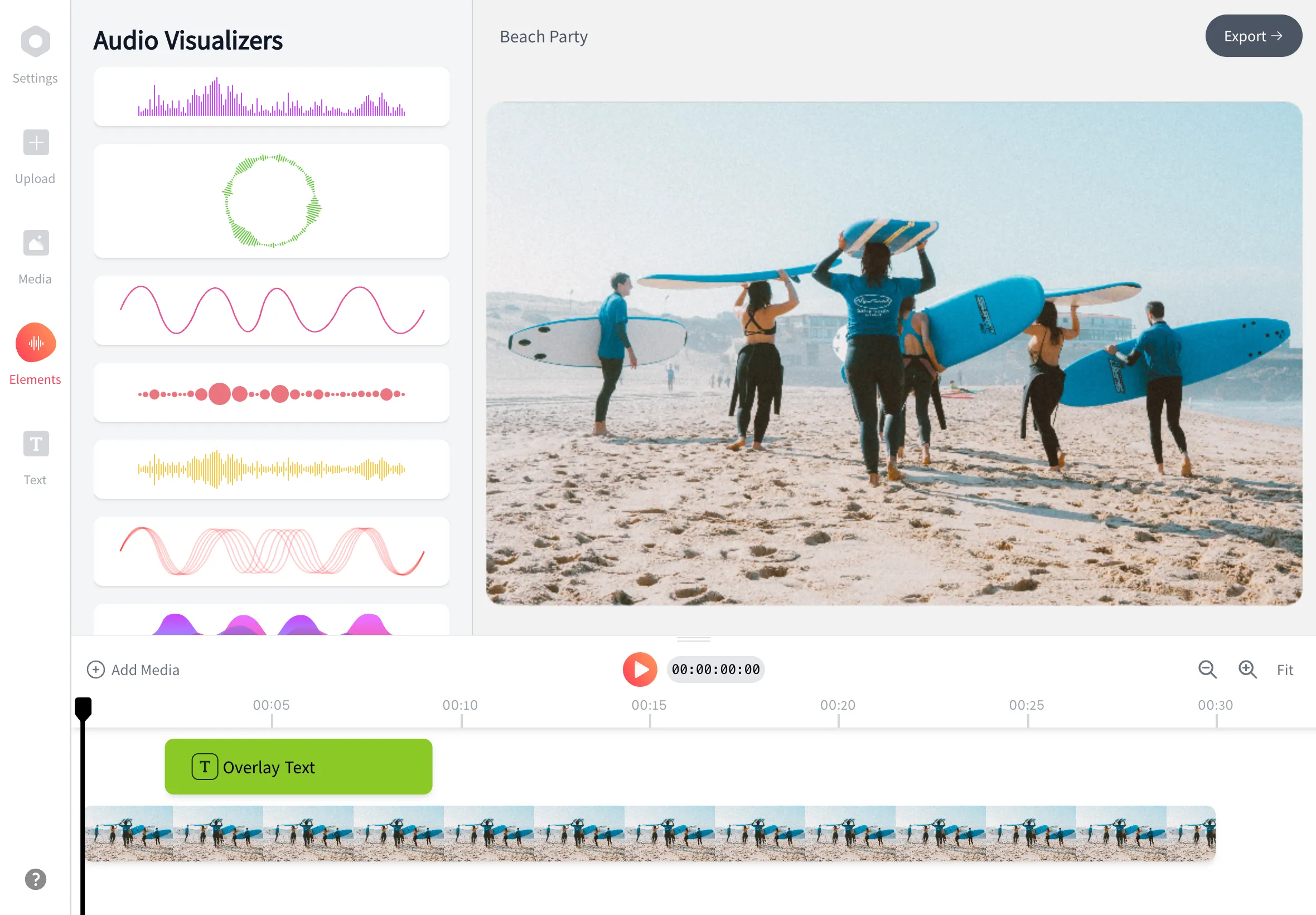
Best 2025 Podcast Promotion Strategy
Looking to grow your podcast?
Here’s what you need to know to get your first episodes in front of a large audience and grow your listener base. Many of these strategies take time, so planning to spend the time building a great foundation to promote your podcast is important.
We’ve broken this down into two main sections—what you should do before you release your first episode and what you should do afterwards.
The podcast promotion strategies all boil down to a few common themes. Create a podcast that people want to listen to and keep producing great content.
To let people know about your podcast release, engage with your potential audience in all of the places where you think that you might find them. That may be on social media—like Facebook groups, Instagram or Reddit forums, depending on your topic.
Then, we’ll talk about calculating your release as well as what you should focus on in terms of being listed and being ranked on top podcast sites. From there, you’ll need to keep engaging with your audience and providing engaging content that’s worth their time. Many of your pre-launch promotion strategies will keep working for you as you continue to produce valuable content.
Most of these promotion strategies, except for paid ads, just require some creativity and human resources. Keep reading and see our top strategies for podcast promotion!
Pre-Launch
Develop your concept
Ultimately, this is the most important thing that you can do and where you should plan to spend a lot of time. It won't do you any good to promote a podcast that doesn't appeal to an audience or get them to listen to your podcast again. When you consider the niche that you want your podcast to fill, make sure that it accomplishes the following:
Adds value for your listeners. You need to offer a unique perspective on an engaging topic that will appeal to your listeners. With over 800,000 podcasts available right now, you'll be competing for valuable time spent listening to podcasts on a morning commute, so make sure that you can stand apart in your niche. If your podcast is just for entertainment, make sure that it hooks your audience and strikes a different cohort than what’s already out there.
Properly defining your target audience early on will help you develop an effective promotional strategy. Simply seek out those who will benefit from your show the most.
Makes people want to keep tuning in. You want a topic that will continue to interest those who listen to your podcast. Listen to podcasts that are similar to yours to see what will keep listeners coming back to hear what you have to say. Then consistently produce a quality program that they’ll return to.
Develop your branding
Make your podcast memorable. With your intended audience at the forefront of your decision-making process, develop your brand. The goal is to develop a cohesive strategy around the content that you’re going to create.
It’s all in a name. With a firmly established value proposition, you need to package it in a way that our audience will relate to it. As with any type of marketing, a catchy name is imperative. You’ll want to make sure that it conveys what your show is about in a fun, memorable way that piques the interest of your average listener as they scroll through a list of podcasts available whatever platform.
This attention to detail should continue all the way down to what you name your individual episodes. Clear, concise, and consistent titles will get you noticed, and hopefully, heard.
Create a complementary website. All shows should have their own website. It’s a space that you can control fully and help to round out your listeners’ experience. Get a logo and integrate it as you promote.
To maximize the benefits of your website, optimize your podcast for SEO. Now that Google can sift through audio and suggest podcasts in search results, it's easier than ever for users to get a quick sense of what your show is about. To attract your target audience, consider using SEO keywords in your titles and first few shows so that you show up in these search results.
You’ll need to keep the site current. Ideally, whenever you upload a new episode, you’ll create a post on your website too. Close each post with social media sharing buttons so that your listeners can share them quickly and easily.
Show notes links to continue the discussion, a contact page and an embedded player will further enhance the user experience. You’ll also want to include a page with all of the subscription options that link to the various platforms that your podcast is listed on.
Allow your listeners to join a mailing list. Consider developing a newsletter to promote interaction with your users. Let them know when you launch and whenever you publish a new episode.
Create your content.
- Outline each of your shows so that you manage your time on-air effectively and cover everything that you plan. Consider listening to what you expect your competition will be so that you can properly distinguish yourself. Use these first episodes to show what you plan to be about and to hook your listener.
- Record your first episodes (3-5 are recommended) before launch. Use quality sound equipment. If you plan to post your podcast as a video on YouTube (to get it in front of some of YouTube's 2 million users), or to use video clips to promote your podcast, consider filming the production simultaneously.
- Edit your episodes. Prepare them for posting. While you’re editing the audio (maybe video, too), focus on grabbing some pull quotes that will draw in some listeners. Cut short clips (1-3-minute soundbites) that you’ll post on social media to tease content in advance of the release.
If you didn’t record the podcast on film and you still plan to post it on YouTube, prepare it for upload by converting it to the preferred MP4 format. Add your logo to it as a background.
Maximize your launch exposure.
You'll want to drum up as much excitement as you can before launch. The most effective way to do this is to add value to online communities where you are likely to find your targeted audience.
- Build your social media presence. If your podcast stems from another online presence like as a natural progression of your blog or Instagram account, teasing the launch. If your podcast is new and completely different, begin posting related content that will serve as a way to interact with your audience in the future.
- Engage with your target audience. On Instagram, follow and comment on influencers' posts if they align with your podcast. Contribute to the conversation. The same goes for Facebook Groups or Reddit communities that may stand to benefit from your podcast. Answer relevant questions on quora that pertain to your podcast subject. Regardless of where you do it, establish your place in the forum. Highlight the value that your perspective brings to the discussion. After you launch, promote your podcast when and where it may be relevant.
- Get your podcast listed on all of the primary streaming services. Submit your podcast to podcast directories, like Apple Podcasts (iTunes), Google Play, Spotify, TuneIn, iHeartRadio, Overcast, Stitcher, SoundCloud, PodBay, and PodTail. Create accounts with each of them and submit your RSS feed to each of these directories. That way, each of your new episodes will be automatically published to each platform. As users browse each of these platforms, they'll find your show listed there.
- Prioritize ranking on iTunes. Most podcast listeners find podcasts through iTunes. For the first 8 weeks after you launch your podcast to iTunes, it is eligible to be featured in the New & Noteworthy section.
- Write a blog with regular posts. If promoting your show to a niche reach out to blogs asd offer to guest post so you can reach their existing audience.
This is a highly visible, coveted spot reserved for new podcasts, and a great way to get your podcast in front of new potential listeners. Apple seems to base inclusion in this shortlist on a couple of things: number of subscriptions and downloads as well as reviews posted in that period.
Post-Launch
Now that you’ve released your first few episodes, you need to keep engaging with your community. Ask for feedback and continue developing quality content so that you retain and grow your audience.
Call to action. With your episodes published, ask your listeners to subscribe, share, and review what you’ve released. Positive reviews boost your ranking, especially within iTunes, and get your show in front of more people.
Make it easy for people to share your episodes from your website and encourage them to tell their friends (since word-of-mouth advertisement is particularly essential to podcasts). Solicit feedback from your audience so that you can improve and cater to topics that they want to hear more about to keep them engaged.
Consider shout-outs to a listener who has left reviews at the end of subsequent episodes. Or consider a giveaway that you can highlight on all of your other platforms to pique interest and encourage interaction during these first pivotal weeks after launch.
Host guests and be a guest. One of the best ways to introduce your show to new listeners is to host an expert or relevant party on your podcast. Ideally, you can advertise your podcast to their fanbase, who may appreciate your content too.
To take it a step further, feel free to design some promotional material. An Instagram post on your guest's page, perhaps with a short teaser clip or a pull quote, can let them know what to look for when the episode is released.
To encourage people to join your show, offer to contribute to their projects as well. Being interviewed on another podcast is an excellent opportunity to capture a new audience who is already familiar with something about your show.
- Reach out to people or brands that you mention. If you find yourself organically referencing a person or product during your show (in a positive way) that your listeners may benefit from, share that clip with them. The brand may decide to share that audio, or a person might share that quote with their followers. If it works out, maybe they’ll even sponsor future episodes further down the line.
- Circle back to your episodes. Promote past episodes if they’re relevant to your audience. Point your readers back to memorable moments that establish your credibility and rapport by linking the episodes in the show notes. If you talked about a trending topic in a previous episode, drop a link and share it with the appropriate hashtags.
- Consider paid ads. If it’s in your budget, consider paying for ads that link to either the podcast landing page on your website or to individual episodes. Keep in mind that it may be hard to get a good handle on how effective they are, and you should be prepared to lose some money in the beginning.
Conclusion
Successfully promoting your podcast takes a bit of a coordinated effort. Still, these tips will make your content truly and easily accessible to the audience that you intend to hear your message. These tactics successfully engage with your user before and after launch.
Pay attention to feedback and carefully track which strategies work for your show. Modify your plan as time goes on to make sure that you get your show on all of the screens that you possibly can.
Look for ways to organically cross-promote your content in a way that continually adds value to your listeners. This will help to get their attention, and well-developed content will keep it. Continue to recognize your listeners and pay attention to what they want to hear from you in the future. Sustainability is what will make all of this effort worthwhile.
Finally, enjoy the process. Passion for your project will guide much of your promotion strategy outside of these typical channels, and makes all of the difference.
Ready to get started? We have a free plan!
No credit card required, our free plan includes a small Echowave.io watermark.
Get Started →







